Reimagining Anderson Hall
Built in 1925, Anderson Hall is historically significant and part of a constellation of buildings that defines the history and vaulted reputation of the University of Washington and the School of Environmental and Forest Sciences.
In the spring of 2023, the Washington State Legislature passed the 2023-25 state budget, including $28.65M toward the $40M cost to renovate Anderson Hall. Construction began in the summer of 2024 and is currently on track to be completed by early 2026. We are thrilled to have this opportunity to advance our vision for teaching, learning, and research in this landmark building.
The design firm Hennebry Eddy and contracting firm Lease Crutcher Lewis were selected to lead this historic redesign and have been collaborating closely with SEFS leadership, faculty, staff, and students. Our design team has been working to create a plan that reflects the budget of the project, historic preservation of the building, and needs of the SEFS community. Together, we have come up with the following five objectives to drive the renovation process:
- To provide welcoming and inclusive spaces enabling the brightest minds in science to work across disciplinary boundaries
- To modernize classroom and office space, supporting impactful research and cultivating a sense of community
- To create flexible learning environments that promote innovation, engineering, and analysis in support of forest-dependent industries and culturally significant uses by Western and Indigenous populations
- To respectfully, thoughtfully, and strategically renovate this historic building
- To strategically reinvigorate the plaza between Anderson Hall, Winkenwerder Hall, and Bloedel Hall
In 2024, staff, faculty, and students in Anderson Hall relocated to offices on the 4th and 8th floors of Condon Hall.
Design + Construction Milestones
Design firm selected; design team begins collaboration with SEFS leadership, faculty, staff, and students ✔
Renderings approved ✔
SEFS moves to temporary location at Condon Hall ✔
Construction begins ✔
Structural upgrades and foundation ✔
Interior framing ✔
Concrete ✔
Masonry and glazing begins on new south entry in May 2025
Land- and hardscaping begins in June 2025
MEPF Rough-In (Mechanical, Electrical, Plumbing and Fire Protection work is ongoing throughout the entire building. This phase takes place before drywall installation.
Elevator Installation (elevator work is underway and ahead of schedule, with tracks and the cab currently being installed.)
Drywall (installation on Level G is scheduled to begin mid- to late July.)
Roof Work (roofing crews are actively working on installing new gutters throughout July.)
Interior framing February – September 2025
Interior finishes (doors, drywall, cabinetry installation) begins in September 2025
Interior framing February – September 2025
Interior finishes (doors, drywall, cabinetry installation) begins in September 2025
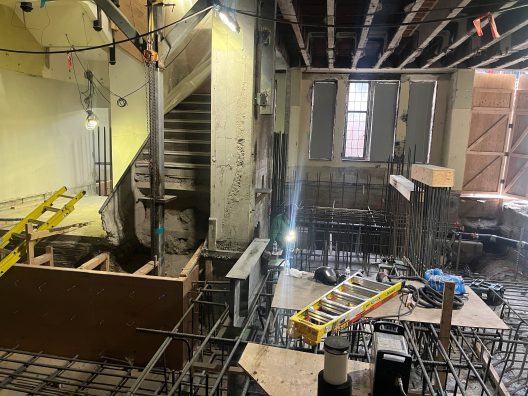

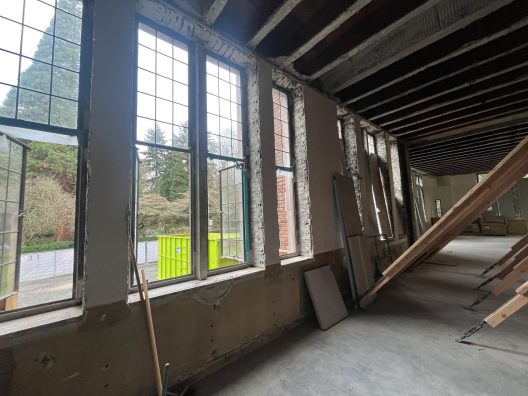
New construction images from Summer 2025
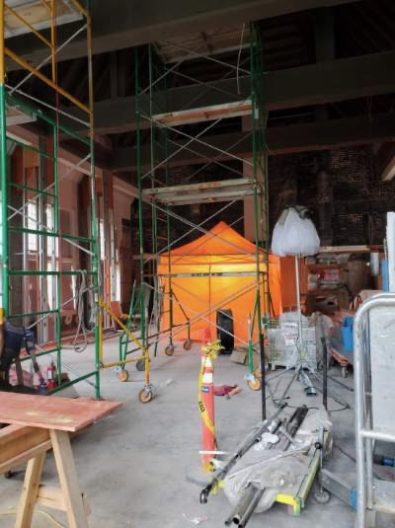
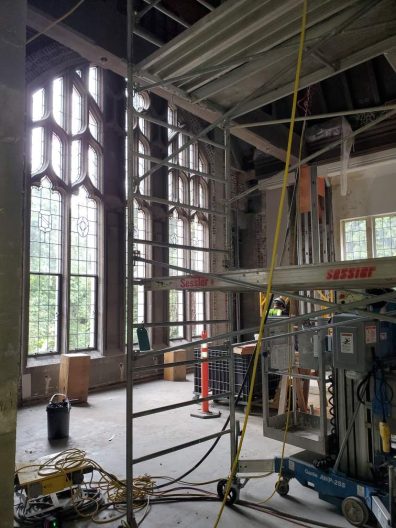
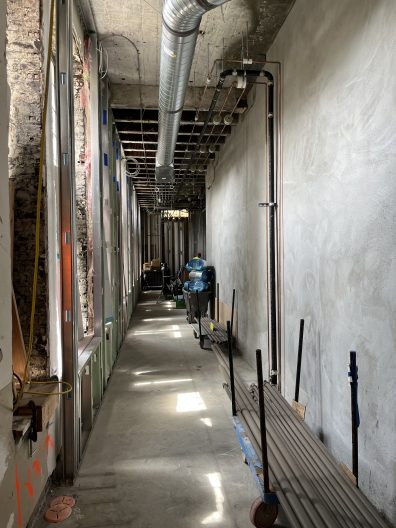
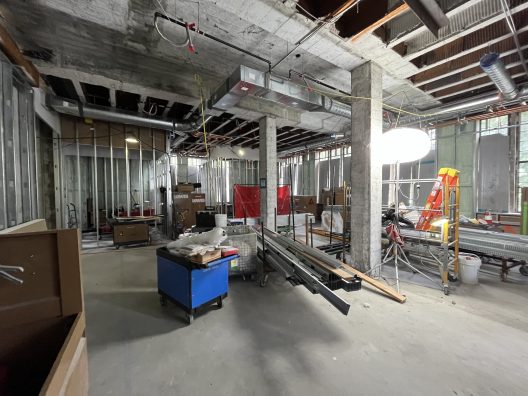
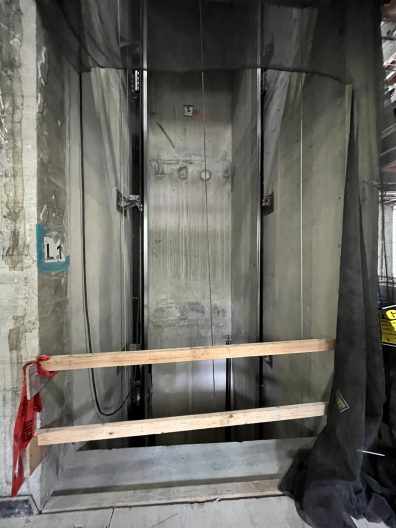
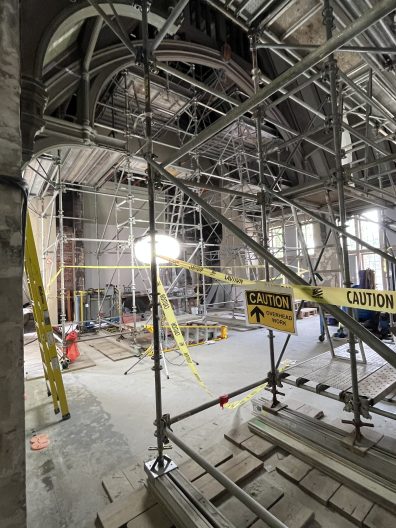
New construction images from late summer 2025




A landmark and a legacy

Anderson Hall is the hub for the University of Washington’s School of Environmental and Forest Sciences, and plays a central role in addressing 21st-century problems facing our planet and species — yet it functions nearly the same as it did a century ago. The building lacks cutting-edge technologies and amenities, and is not accessible for all people, creating substantial obstacles to education and research.
Our goal is simple: retain Anderson Hall’s legacy of leadership and innovation by meeting the needs of the environmental and forest sciences community today. We are embarking on a campaign to renovate the Hall and extend its deep legacy for future generations — join us.
Ensuring Anderson Hall’s lasting impact
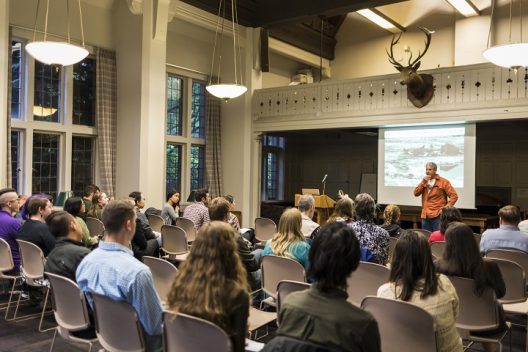
Standing tall as an emblem of the University’s rich history of world-leading research and teaching in forestry and forest resources, Anderson Hall serves more than 1,000 students, faculty, postdocs and staff. Renovating Anderson Hall will ensure the community that has gathered within its walls since 1925, along with state, federal, tribal, industry and community partners, will continue to advance our fundamental understanding of:
- climate adaptation and mitigation
- renewable resource use
- ecological restoration
- wildfire management
- wildlife conservation
- rural economic development
- healthy urban ecosystems
World class technology for world class learning
Anderson Hall serves as a place for innovation in support of forest-dependent industries and livelihoods, and culturally significant uses by diverse Western and Indigenous populations. The School offers the state’s only accredited degree programs in Forestry and in Natural Resources and Ecosystem Management, and a highly regarded accredited engineering degree program. Between 2009 and 2020, we’ve doubled enrollment in our undergraduate programs, now supporting more than 500 undergraduate and graduate students annually.
We need a space to meet the learning needs of these emerging leaders.
An inclusive and collaborative space to push boundaries of knowledge
A hallmark of the School of Environmental and Forest Sciences is its vibrant and innovative academic culture, one that supports and rewards collaboration. Through a renovation that prioritizes collaborative spaces, enhances technological facilities, addresses long-standing accessibility and safety issues, and modernizes building systems, Anderson Hall will become a welcoming, inclusive and highly productive space. Updated interiors will attract and retain new students and faculty, and support active learning and research essential for environmental leadership and problem-solving – a hub for education in the college and on campus.
A campaign to steward Anderson Hall’s Legacy Into The Future
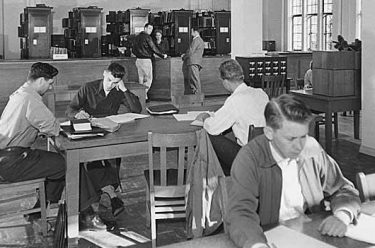
Anderson Hall represents more than a century of the University’s contributions to the state’s environmental, societal and economic well-being. The building has served as a focal point for educating generations of students. The renovations include critical and necessary upgrades to ensure the health, safety, and wellbeing of the next generation of students.
We invite you to be a part of this iconic emblem of learning. To learn more about the campaign for Anderson Hall, please contact Laura Perez Hamilton, Senior Director of Advancement at the College of the Environment. If you’d like to support the renovation, renewal and remodel of Anderson Hall and help maintain the building’s future facilities, consider giving to the School of Environmental and Forest Sciences Renovation and Renewal Fund.
lphamil@uw.edu | 206.221.6372.
Schedule
| Design & permit | January 2023 – June 2024 |
| Construction | July 2024 – December 2025 |
| Occupancy | Winter Quarter 2026 |
Funding Structure
| State Capital Allocation 23-25 | $28,650,000 |
| State Bldg./Const. Account 09-11 | $200,000 |
| Central Equity (Provost) | $2,950,000 |
| Unit Equity (College of the Environment) | $7,000,000 |
| Private Philanthropy | $2,000,000 |
| Total Project Cost | $40,800,000 |
Renovation and floor plans
Renovating Anderson Hall will allow the School of Environmental and Forest Sciences to:
- maintain competitive excellence in instruction, research and recruitment
- provide world-class, internationally recognized knowledge and leadership on environmental and natural resources issues
- support modern pedagogies and increase capacity for general use
- preserve a historic facility, enhance accessibility and bring structure and systems up to code compliance
Changes to Anderson Hall will include substantial alterations addressing code deficiencies such as:
- structural, seismic, life safety, hazardous materials and accessibility
- replacement of heating, ventilation, plumbing, electrical, fire protection, mechanical, and communication and alarm systems for functionality and reduced operating costs
- complete renewal of building envelope to prevent water infiltration and improve energy performance and occupant comfort
- classroom size flexibility and functionality to be increased with multimedia and furniture upgrades
- ADA accessibility, including the addition of elevators
Anderson Hall Designs
Need a printable version of this page? Please download the Reimagining Anderson Hall fact sheet (1MB PDF). To learn more about the campaign for Anderson Hall, please contact Kearstin Williams, Associate Director for Advancement: kearsw@uw.edu, 360.521.0644